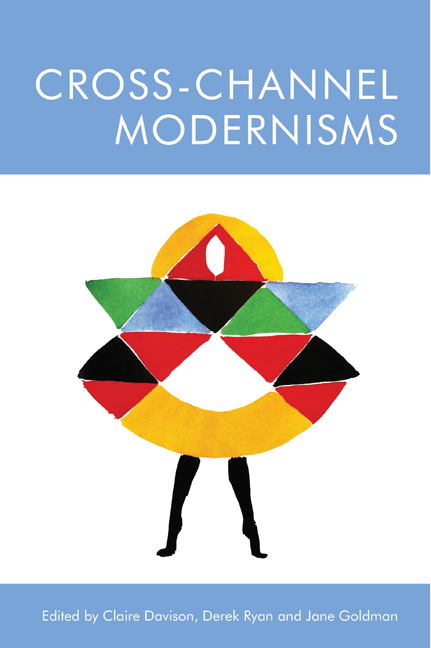Book contents
- Frontmatter
- Contents
- List of Figures
- Notes on Contributors
- Introduction: Cross-Channel (Transmanche) Modernisms
- Interlude: Translating
- 1 On Unknowing French? Rhythm and Le Rythme on a Cross-Channel Exchange
- 2 Impressions of Translation: Ford Madox Ford’s Cosmopolitan Literary Crossings
- 3 Sydney Schiff and Marcel Proust: Table-talk, Tribute, Translation
- Interlude: Fashioning
- 4 Cross-Channel Modernisms and the Vicissitudes of a Laughing Torso: Nina Hamnett, Artist, Bohemian and Writer in London and Paris
- 5 Jean Rhys’s comédie anglaise
- 6 Betray to Become: Departure in James Joyce’s A Portrait of the Artist as a Young Man
- Interlude: Mediating
- 7 Close Up and Cross-Channel Cinema Culture
- 8 Debussy at the Omega Workshops
- 9 Across the Other Channel: Elizabeth Bowen and Modernist Mediation
- Coda: ‘You, who cross the Channel’: Virginia Woolf, Departures and the Spectro-Aesthetics of Modernism 215
- Index
Coda: ‘You, who cross the Channel’: Virginia Woolf, Departures and the Spectro-Aesthetics of Modernism 215
Published online by Cambridge University Press: 03 October 2020
- Frontmatter
- Contents
- List of Figures
- Notes on Contributors
- Introduction: Cross-Channel (Transmanche) Modernisms
- Interlude: Translating
- 1 On Unknowing French? Rhythm and Le Rythme on a Cross-Channel Exchange
- 2 Impressions of Translation: Ford Madox Ford’s Cosmopolitan Literary Crossings
- 3 Sydney Schiff and Marcel Proust: Table-talk, Tribute, Translation
- Interlude: Fashioning
- 4 Cross-Channel Modernisms and the Vicissitudes of a Laughing Torso: Nina Hamnett, Artist, Bohemian and Writer in London and Paris
- 5 Jean Rhys’s comédie anglaise
- 6 Betray to Become: Departure in James Joyce’s A Portrait of the Artist as a Young Man
- Interlude: Mediating
- 7 Close Up and Cross-Channel Cinema Culture
- 8 Debussy at the Omega Workshops
- 9 Across the Other Channel: Elizabeth Bowen and Modernist Mediation
- Coda: ‘You, who cross the Channel’: Virginia Woolf, Departures and the Spectro-Aesthetics of Modernism 215
- Index
Summary
Let's ferry back our souls across the Channel.
Wilfred Owen, ‘A New Heaven’ ([MS] 1916)A specter is always a revenant and thus it begins by coming back.
Jacques Derrida, Specters of Marx (1993)The sea has another voice than this.
Virginia Woolf, ‘The Royal Academy’ (1919)I think that the dead are with us.
John Berger, ‘Interview’ (2015)In Woolf's writings, the marginal space of the coast unexpectedly brings about ‘the silent apparition’ (Woolf 1927: 207) of material aspects of history, including warships and the many nameless soldiers who departed for and died in the Great War (the war departed), remarkably prefiguring the Derridean notion of the spectre as political dead. A Derridean spectro-aesthetics arises here in the context of a cross-Channel modernism troubled by the carnage and futility of war. Touching on Jacob's Room (1922), Mrs Dalloway (1925) and To the Lighthouse (1927), in constellation with works by Wilfred Owen, T. S. Eliot, E. M. Forster, Thomas Hardy, Mulk Raj Anand, C. R. W. Nevinson, among others, this chapter draws on three cross- Channel essays by Woolf: ‘Heard on the Downs: The Genesis of Myth’ (1916), ‘The Royal Academy’ (1919) and ‘To Spain’ (1923). Woolf's often metaphoric treatment of the sea does not entail a dismissal of history, including maritime history, but is, on the contrary, historical-materialist, merging history with vision in ways departing from, and subverting, the visual rhetoric prescribed by the British War Propaganda Bureau to official war artists.
The concept of ‘departing’ in its polysemy (‘depart for’, ‘the departed’, ‘depart from’) brings into play the interrelation between three of its main senses: spatial movement, final demise, dissent, all involving a decentring and/or a crossing of boundaries. Woolf's frustration at the government's use of Britain's geographical insularity to keep civilians in the dark about the reality of war emerges repeatedly in her wartime writings: the Channel was used as a political barrier, facilitating state suppression of information about the conflict and its human costs. Woolf's strategic liminal stance is deeply informed, instead, by a cross-Channel perspective that is historical, political and aesth-ethical. Inherently entailing an oppositional poetics, Woolf's liminal outlook from the watery borders of Great Britain – specifically its southern edges – involves, and builds upon, metaphorical and literal crossings of the Channel, beginning, in the latter case, with her own.
- Type
- Chapter
- Information
- Cross-Channel Modernisms , pp. 215 - 242Publisher: Edinburgh University PressPrint publication year: 2020



